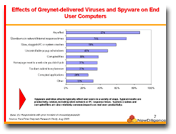Employees are downloading “Greynet” (unsanctioned) applications at an escalating clip and unleashing more spyware and adware in the process. The extra mess is
costing enterprises on average over $130,000 a month to mop up.
Those are just some of the conclusions from a survey by FaceTime Communications, which also sells software security for enterprise IM networks. The survey, conducted by market research firm NewDiligence,
said enterprises now spend over $130,000 per month in IT time fighting
spyware-related issues.
Greynet applications are those not officially sanctioned or supported by the enterprise or IT staff. The categories include instant messaging, Web browsing/surfing software (including streaming media and RSS
What’s helping to fuel the skyrocketing spyware stats? Consider some of
the responses from end users. With anonymity guaranteed, a
majority said they believe they have the right to install Greynet applications at the workplace.
“They also believe IT has any security issues associated with Greynets
under control,” the survey added. Yet, out of the group that thinks IT can
fix any mess they unleash on the enterprise, some
87 percent of the same end users reported a spyware or virus problem
resulting in slow Internet response times, pop-up ads and corrupted files.
To their credit, they understood the risks of downloading an unsanctioned
application, said Frank Cabri, vice president of marketing at FaceTime
Communications.
 |
| Effects of Greynet-delivered Viruses, Spyware (click for larger view) |
“But the majority also felt that the IT organization had the
problem handled so they can use the tools they feel they need for the job,
despite the fact they admitted to spyware problems in the last six months,”
he told internetnews.com. “So their confidence may be misplaced.”
The survey was conducted over the past three months, and consisted of 622
IT managers and 564 end users across small, medium and large businesses. “We
did the survey to understand what the IT concerns are, and the consequences
of using these applications,” he added.
Although some Greynet applications may be benign, and some applications may be
considered critical to day-to-day job functions, such as IM, the survey
found that unsanctioned applications are unleashing an increase in
spyware-related incidents.
In addition, the survey also gauged how fast high-end users are adopting unsanctioned network applications on businesses’ PCs.
The survey said within the next six months, virtually all end users will have deployed some type of Greynet application and eight out of 10 end users (78 percent) now use one or more Greynet applications. This includes such critical applications as free instant messaging clients, or trying out a free VoIP
Expect this number to rise to 93 percent within the next six months, the
survey added.
Among IT managers that replied to the survey, three in 10 who
experienced a virus incident said IM was the root of the problem, such as
employees clicking on a link from an IM not on their buddy list and
launching a Web site loaded with malicious code.
Of the IT managers that have rolled out perimeter security that consists of gateway anti-virus, URL-filtering and Intrustion Detection Systems
Kailash Ambwani, president and CEO of FaceTime Communications, said
enterprises are seeing significant adoption of both “good” and “bad” Greynet
applications on employee PCs.
Cabri said overall, the conclusion is that network security will have to
catch these issues before they even invade the premises, which means the
trend to add more network security to the perimeter and in front of the
network will continue.


